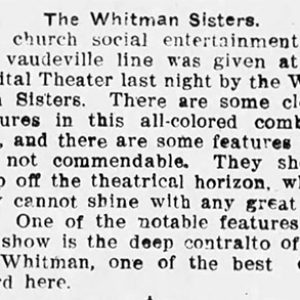calsfoundation@cals.org
Essie Barbara Whitman (1882–1963)
Essie Barbara Whitman was a member of the renowned Whitman Sisters Company. The group of African-American sisters, who were entrepreneurs as well as entertainers, developed their own musical, dance, and comedy performing arts company. From 1901 to 1943, the group performed throughout the United States, becoming the longest-running and highest-paid act on the Theater Owners Booking Association (TOBA) circuit.
Essie Whitman was born on July 4, 1882, in Osceola (Mississippi County) to the Reverend Albery Allson Whitman, who was a bishop in the Methodist Church, and Caddie A. Whitman; she was the second of four sisters who included Mabel (1880–1942), Alberta (1887–1963), and “Baby” Alice (1900–1969). Rev. Whitman, later known as the “Poet Laureate of the Negro Race,” is said to have taught his daughters to sing and to dance the double shuffle so that they might have “healthy and playful exercise.” His lessons also prepared his daughters for a role in his evangelical tours and church benefits.
Around 1898, the sisters made the transition into show business, initially performing in white vaudeville as the Danzette Sisters. Upon Rev. Whitman’s death in 1901, the Whitmans began to tour the South as jubilee gospel singers, with their mother serving as chaperone. The sisters were exceptionally light-skinned, leading audiences to believe them to be white. However, the family soon decided to perform for black audiences, organizing a troupe known as the Whitman Sisters New Orleans Troubadours. The Whitmans’ fast-paced performances were based on a variety show format of songs, dances, and comedy skits. The shows grew to include twenty to thirty performers, a chorus line, a jazz band, and a plethora of young, talented dancers.
Essie Whitman’s talent became apparent during a talent show in Kansas City, Missouri, in 1892 when she took first place with her rendition of “God Won’t Love You If You Won’t Be Good.” Described as a “resonant contralto,” she had a voice that was loud and low-pitched. Her distinctive singing style and her flair for comedy became her trademarks. Throughout her tenure with the troupe, she also worked on costume design/execution for the performers.
In 1921, Whitman released two solo recordings with the Jazz Masters for Black Swan Records and in 1924 and 1925 with Paramount Records. Four Essie Whitman recordings were included in a March 2001 release by Timeless Records, Tight Women and Loose Bands, 1921–1931.
The Whitman sisters were immensely talented entertainers and were equally impressive as entrepreneurs. By taking full control of their business, the Whitmans defied stereotypes concerning the traditional role of women in show business while simultaneously standing up against racial segregation in vaudeville. Considered “the royalty of Negro Vaudeville,” the Whitman operation became a springboard for future generations of musical entertainers and stage luminaries, including Bill “Bojangles” Robinson and Jeni Le Gon.
After retiring from the act in 1926, Essie Whitman became a lay preacher with the Metropolitan Church in Chicago, Illinois. She was married three times, to Prince Ishmael, Johnnie Woods, and Carter Hayes. She was an active evangelist until her death on May 7, 1963, caused by smoke inhalation from a fire that destroyed the family home.
For additional information:
Abbott, Lynn, and Doug Seroff. Out of Sight: The Rise of African American Popular Music, 1889–1895. Jackson: University Press of Mississippi, 2002.
George-Graves, Nadine. The Royalty of Negro Vaudeville: The Whitman Sisters and the Negotiation of Race, Gender, and Class in African American Theater 1900–1940. New York: Palgrave Macmillan, 2000.
Toney Butler Schlesinger
Granite Bay California
 Early Twentieth Century, 1901 through 1940
Early Twentieth Century, 1901 through 1940 Whitman Sisters Article
Whitman Sisters Article 




Comments
No comments on this entry yet.